The most popular green cleaning recipe on Bren Did is Natural Homemade Laundry Detergent. It is also the post that also gets the most questions and emails. This question and answer about homemade laundry detergents addresses the most common concerns about homemade laundry supplies.
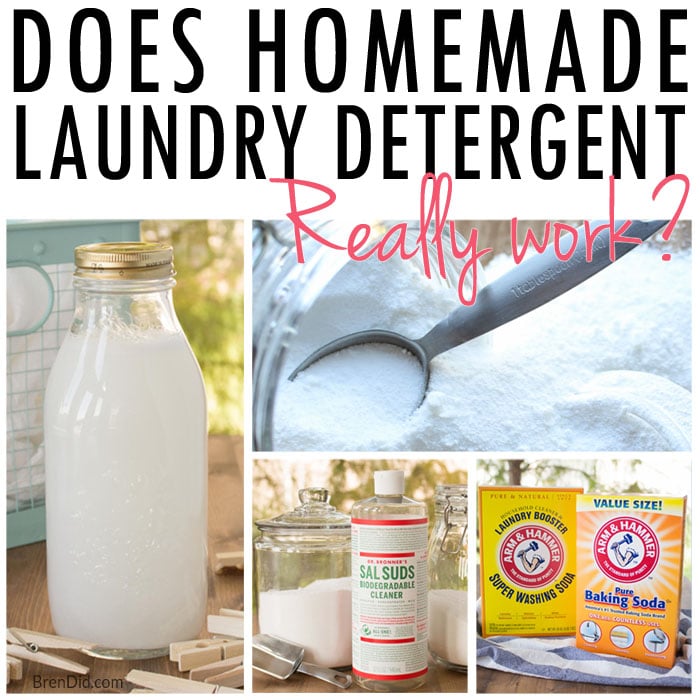
Have you seen recipes for making homemade laundry detergents but wondered if they would work effectively, if they would ruin your washing machine, or if they were all a big waste of time? I have been making and using my own laundry detergent for more than 3 years and want to share my experiences with you.
Should I try make homemade laundry detergents?
Everyone should do their own research and make their own decision about using homemade laundry supplies. I make my own laundry supplies for two reasons:
- To eliminate dangerous, unnecessary, man-made chemicals from my home. When I began my journey to a greener home I found out that my laundry detergent could cause health problems such as cancer and respiratory issues so I did not feel safe using it for my family’s laundry.
- To save money on natural cleaning products. The all natural commercial laundry detergents I feel safe using range from $14.00 to $15.00. This tripled the cost of my laundry detergent.
Do homemade laundry detergents clean well?
I can’t speak for ALL homemade laundry detergent recipes, but I am completely satisfied with my two DIY versions (I make powdered laundry soap and liquid laundry detergent). I have been using homemade laundry detergent for 3 years and have had no problems with my washing machine or cleanliness of laundry.
The Ingredient are the Key
To judge the cleaning power of a homemade laundry detergents you need to know about its ingredients:
1) Soap or Detergent
“Laundry detergent” is a name we commonly use for ALL laundry cleaners, just like we call all facial tissues “Kleenex.” In reality, some laundry detergents contain soap and some contain detergent. (If a homemade laundry recipe does not contain either soap or detergent it will not clean well.)
Both soap and detergent are used to clean: Both contain surfactants (substances that help clean by reducing the surface tension of water). Both soap and detergent remove soils and bacteria when aided by friction and water.
Soap and detergent are made differently: Soap is made from vegetable or animal fats and oils, synthetic detergents are made from petrol-chemicals. Soap has been around since around 2800 B.C., synthetic detergents have been around since 1916.
The history of soap and detergent: Synthetic detergents were developed due to WWI shortage of fats for soap making in Germany. Production took off in the US after WWII due fat and natural oil shortages and the need for a military grade cleaner that would work in sea water. (Until WWI all laundry was washed using SOAP.)
Pros and cons: Soap is considered better for your health and the environment than detergents. Detergents are toxic to fish and wildlife. Soap can react with minerals in the water and leave a residue if not rinsed correctly.
Common soaps in homemade laundry recipes: Dr Bronner’s Castile Soap, Kirk’s Castile Coconut Soap, Kiss My Face Olive Oil Soap, Zote, Ivory Soap bars
Common detergents in homemade laundry recipes: Sal’s Suds, Ivory Flakes, Fels Naptha
2) Other Laundry Ingredients
Both homemade “detergent” and synthetic detergent contain alkalis (“builders” to help soften hard water, my version of homemade detergent uses washing soda and baking soda). Both homemade “detergent” and synthetic detergent contain brighteners (synthetic detergents use OBAs, my version of homemade detergent uses sodium percarbonate).
Using Safe Ingredients in Homemade Laundry Detergents
Homemade laundry detergents are not always more natural or safe than commercial detergents. If you are making detergent to protect your family from dangerous, unnecessary chemicals you must select the correct ingredients.
My homemade laundry soap uses natural substances that are rated safe by the EWG for use on humans and the environment. Unfortunately, many detergents recipes contain ingredients made from chemicals that can be dangerous to humans and the environment.
For example:
- Fels Naptha rates a C on the EWG scale and contains artificial fragrance, dye, and petroleum products.
- Zote rates a C on the EWG scale and contains artificial fragrance and dye.
- Ivory Soap rates a 3 on the EWG scale and contains artificial fragrance.
- Scent Boosters such as Gain Fireworks and Downy Unstopables rate a D or F on the EWG scale and and contain artificial fragrance, dye, and petroleum products. These products contain oily polymers that coat laundry in wet and dry environments, trapping dirt and bacteria that makes fabric dirtier over time.
Check all laundry detergent ingredients on the Environmental Working Group’s database to keep the laundry detergent all-natural.
Does homemade laundry detergent get your laundry white?
Commercial detergents get laundry brilliant white by adding a coating of harmful chemicals to clothes that make them appear bright white (normal clean laundry appears yellowish to the naked eye). These substances don’t get your clothes any cleaner, but trick your eyes so that they seem whiter and brighter.
The two most common types of whiteners are bluing and fluorescing.
- Bluing is what your great grandma used to make white appear whiter, it is fine blue iron powder suspended in water. The bluing counteracts the natural yellow in items (just like blue shampoo is sold for platinum blond or white hair) and eventually wears off. (The data is still out on the safety of bluing.)
- Optical brighteners (OBAs) absorb yellowish light and re-emit it in the blue region making whites seem really bright. They can cause skin irritation and are dangerous to the environment. (OBAs are widely considered unsafe.)
To get your laundry whiter you should:
- Use the correct water temperature – Fabrics get cleaner in warm wash water that has had detergent dissolved in it. Fill your washer with water, add the detergent to dissolve, then add laundry.
- Allow laundry to agitate – Friction in the washing machine gets clothes clean. Allow laundry to freely move and they will get cleaner, don’t over fill or stuff your washer.
- Give the cleaning agent enough time to work – Pretreat tough stains to give the cleaners extra cleaning time or soak tough loads instead of piling on extra detergent.
You can also naturally white laundry by soaking clothes in lemon juice and water, hanging them out to line dry in the sun, using a solution of hydrogen peroxide and water, or using a non-chlorine oxygen based bleaches.
Does homemade laundry detergent make clothes smell clean?
The commercial laundry industry has convinced us that clean laundry smells like the powerful scent of synthetic fragrances. In reality, the artificial scents that make laundry smell like mountain streams or fields of flowers are toxic substances that coat laundry with a waxy substance. This oily coating smells strongly and is hard to remove from fabric. These substances are absorbed into your skin when you wear your clothes, sleep on your sheets, or dry off with a towel. Truly clean laundry smells like nothing! (If you have odors check out my post about eliminating smelly laundry.)
Do homemade laundry detergents build up in your machine?
Soap and detergent can both works great for household laundry if used correctly. If you use too much soap in each load or have hard water laundry soap can leave a residue.
- Any “soap scum” (residue that may form when soap is used in hard water) can be eliminated by adding white vinegar to the final rinse water. Vinegar naturally breaks down soap residue. I fill my fabric softener dispenser with white vinegar or use a Downy ball full of vinegar in each load.
- Please be aware that detergent residue and hard water laundry problems also affect synthetic detergents. (This is why all kinds of laundry additives from water conditioners to brighteners are sold in the laundry aisle.)
The final decision homemade or store bought?
I would rather deal with a few disadvantages to using soap for laundry than expose my family to unnecessary man-made chemicals. You should decide what is right for your family.
For more information you should read:
- Grade A Laundry Detergent
- Borax Free Liquid Laundry Detergent
- Homemade Laundry Detergent Question and Answer
- How to Naturally Clean Smelly Towels
Like my green cleaning tutorials? Sign up for my newsletter below and never miss a thing!


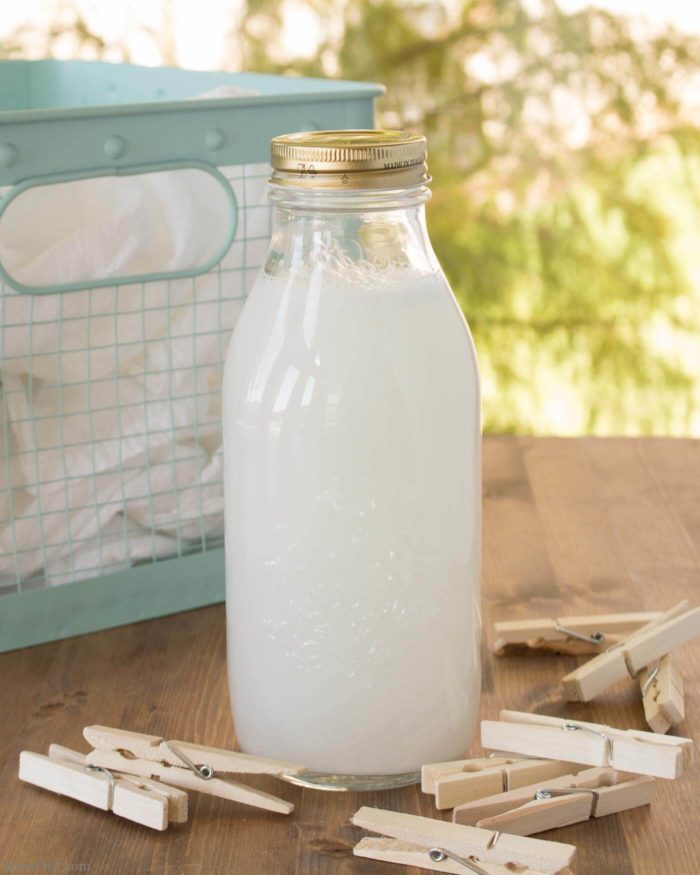
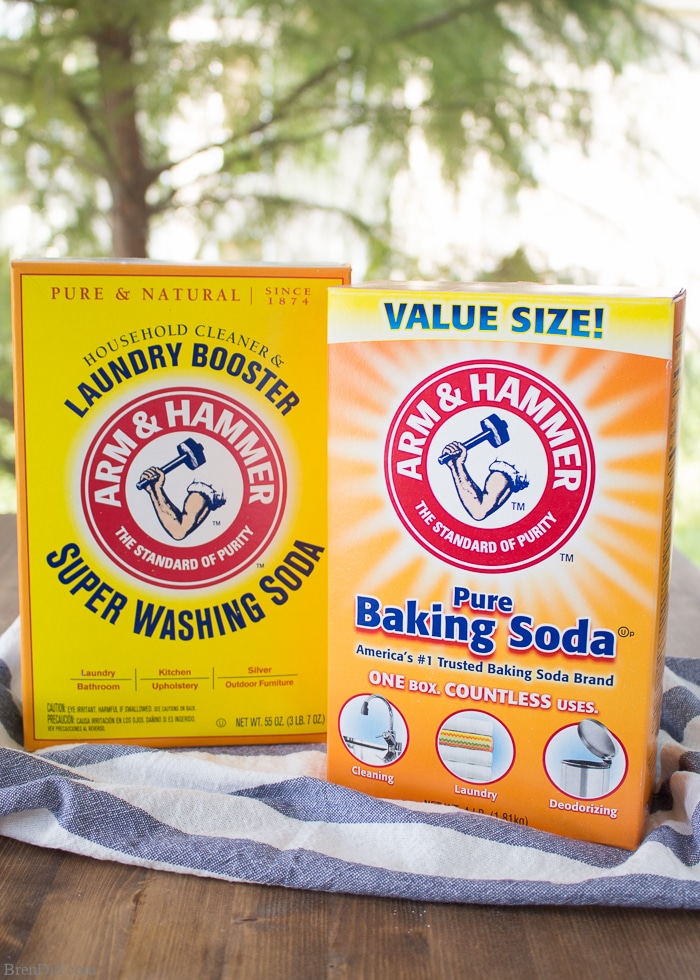
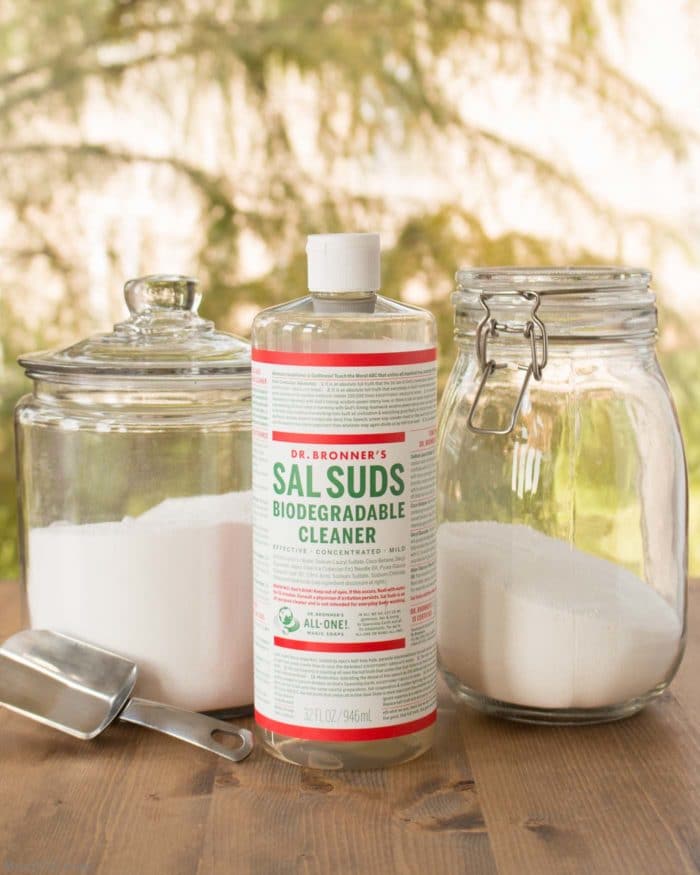
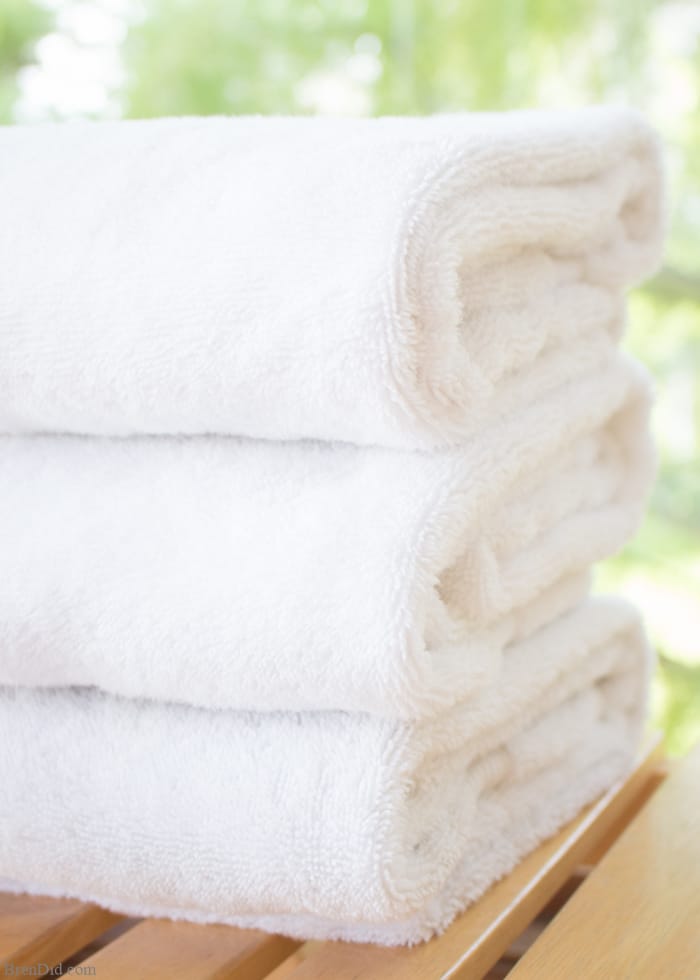
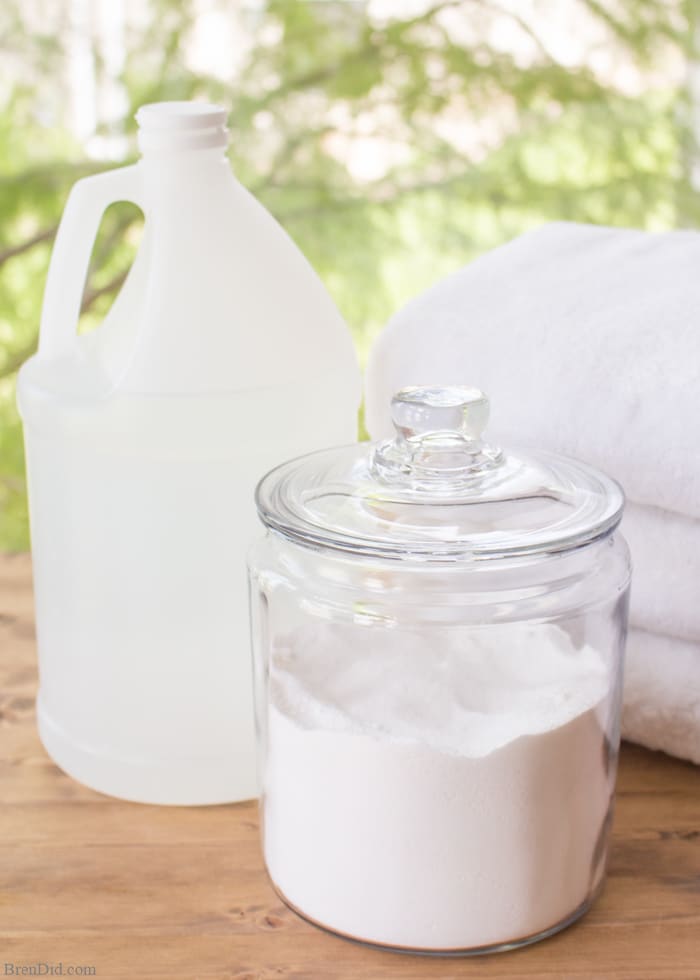
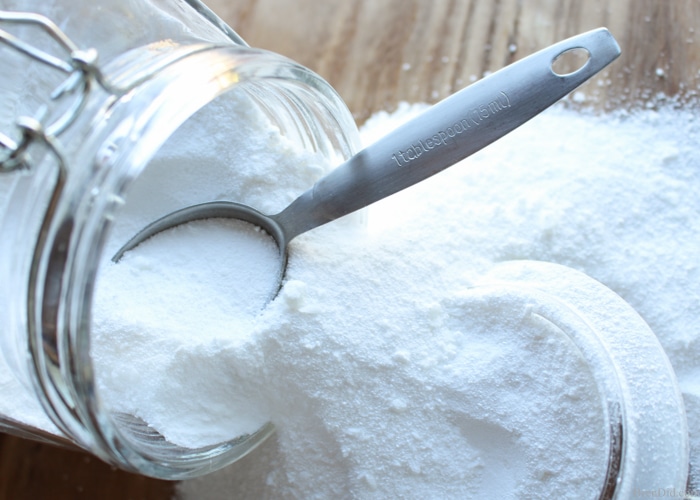

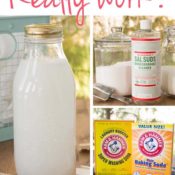
Michelle Charles
The best laundry recipe. I have been using it for 3 years now and love love it. Saves a whole lot of money. Even my husband loves it and enjoys the natural things I do. Thank you my dear for this recipe.
Bren
Thanks, Michelle! I appreciate the compliment!
Lucinda macy
Hi there!
I have been busy making a lot of your recipes for my home:-) Thank you!
As I am making the dry laundry detergent, I am wondering if this will stay “mixed” or if it needs to be stirred or shaken along the way? I notice that the ingredients have different weight and size and thought over time they may separate. A friend I was talking to about said that the purpose of “fillers” in commercial laundry powder and liquids is that they are “stabilizers” so that the ingredients do not separate, but stay uniform. Any help on this topic?
thank you very much~
Lucinda
Bren
Lucinda, the mix stays well combined for me. I think the baking soda helps keep the Castille soap combined.
Nancy Moffett
I thought I saw a recipe to make DIY oxyclean
Bren
I do not have a DIY oxyclean recipe, but I have seen liquid DIY versions online. This recipe needs the powdered version to work.
Elizabeth
Hydrogen peroxide & peroxide work great! That’s my homemade Oxiclean!
Elizabeth
Sorry! I didn’t post the right recipe! 1/2 cup of peroxide 1/2 cup of washing soda, 3-4 gallon of hot water soak stained clothes for 30 mins to overnight, depending on stains! Then I wash as much dual with my homemade detergent, homemade scent booster. I also make my own stain remover with peroxide, Sal suds, & baking soda.
Penny Mitchell
Hi Bren! I really appreciate your website and the information you’ve shared!!
I’d like to use your recipe to make my own detergent and I have no prior experience with this. I have a very large front load washing machine, 4.5 cu ft. I am fairly certain that I need to add the detergent to the bottom of the drum (before adding laundry) but I am unsure how much detergent to add.
The volume of laundry will be a factor but generally speaking, how do I know where to start? I previously used laundry pods (Amazon Brand – Presto! 94% Biobased Laundry Detergent Packs). I used 1 pod for a standard load. For example, 1 queen size set of linen sheets. I used 2 pods for a large load. For example, 1 set of queen linen sheets + 1 linen duvet cover & shams.
I’m also planning to add the vinegar to the RINSE cycle. I have unknowingly added this to the initial wash and I now understand (thanks to your website!!) why I wasn’t getting the results I expected. :-0
I really appreciate your assistance!
Bren
I would start with 1 -2 tbsp of the laundry detergent and see how well it cleans for you. I would increase, if needed, to 4 tbsp max. Yes, you’re correct, the vinegar is best in the rinse cycle. Good luck!
Megan Espe
Hi Bren! I stumbled across your website a few months back and it finally gave me the push to make my own household cleaners after years of meaning to. It helps that I feel like I can trust you because I was your sister’s roommate in college. Small world!
I made this powdered laundry detergent a couple of weeks ago. My husband is someone who loves all things store-bought and chemical-laden, so I’ve had to approach the topic of making our own cleaners carefully with him. Last weekend he worked outside cutting trees and came home with muddy jeans. This detergent got them clean, with no pre-treating. I think he’s now sold!
I bought a bag of lemons for cheap at Aldi the other day, and I’m off to make lemon-scented vinegar today, as well as my own fabric softener. Who knew homemade cleaners could become a new hobby and obsession? Certainly not me, but whatever inspires me to keep a cleaner house is a good deal. Thanks for your efforts on this site!
Bren
Thanks for commenting, Megan. It is a little addicting to make homemade cleaners. Glad you like the detergent, hope the lemon vinegar is a success! -Bren
Adrienne
Hi Bren,
I’m wondering what the detergent ingredients are in your formulas. Also have you ever heard of issues with the vinegar damaging the components of the washing machine? Thanks much!
Adrienne
Hi again, Bren. I just reread your post and I answered my own question….you don’t use any :). Thanks for an interesting post — this info on soap vs detergents is clearly something that is confusing a lot of people.
Bren
I’m glad you found it helpful, Adrienne!
Bren
Hi Adrienne! This is a soap based laundry soap, it uses no detergent. If you want a homemade detergent without borax try my liquid laundry detergent. I have never heard of vinegar damaging a washing machine. I have been using vinegar as fabric softener for years with no problem. If you have concerns I would add it to the wash tub with a Downy ball instead of adding it to the dispenser. Good luck!
Tori
Hi Bren,
I was so excited to try your powdered laundry detergent! We will soon be moving into our first house and I’m lining up all my practices and habits beforehand.
Having decided to try your detergent when we get our washing machine, I stumbled across lots of articles talking of how the soap builds up in the fibres of clothes. Lots of these articles stem from bloggers who once praised their DIY laundry detergents and encouraged readers to make the switch.
I still love the idea of making one, but am very apprehensive now! The articles I’ve found often speak of stripping the laundry and the water being completely black and totally gross… I’d be really interested to know whether you’ve ever tried stripping your laundry? The other thing that I’ve read is that soft water may be one of the instances where the DIY detergent works – do you know how hard or soft your water is?
Sorry for all the questions, just trying to determine whether or not this recipe could work for me! Looking forward to at least trying your fabric softener and air freshener 🙂
Bren
Hi, Tori. I’ve seen those article too so I understand your concern. You can read a big post I wrote about soap vs detergent here: Do Homemade Laundry Detergents Really Work . Build-up has never been a problem for us. The build up people are talking about is usually caused by REALLY poor ingredients in homemade detergent — I have heard of people using Downy Unstopables (or similar products) in their homemade laundry soap which would cause waxy build up or using hair conditioner as fabric softener which would also cause a ton of build up. We have hard water so I ALWAYS use white vinegar in the rinse cycle (I use it for all detergents, not just my homemade one. I use NO commercial fabric softener.) Soap scum is is neutralized by the white vinegar (which is exactly what you want to happen)! I use 1/2-1 cup of white vinegar per load (I fill my fabric softener dispenser to the top). Good luck with your natural laundry journey! -Bren
Candice
We have been using homemade laundry soap for about six months, and about two months ago we started noticing that our bath towels will not absorb water properly anymore. Our recipe is as follows:
1/2 c. borax
1/2 c. washing soda
1/3 bar Fels Naptha
21 c. water
We have an HE washer. We almost always wash with cool water (we are budget conscious), and our machine does not have a fabric softener dispenser (and Downy Balls are not designed for HE machines). I am intrigued by using vinegar, but with an HE, the cycle length is determined by the machine so you have to pretty much babysit it to catch when the rinse cycle starts. Perhaps using vinegar would have helped, but at this point we are pretty disappointed with homemade laundry soap. The price is right for the soap ($0.04-$0.06 per load), but having to add 1 c. vinegar per load increases the cost by $0.10 to $0.15 per load. Might as well buy 7th Generation and have towels that WORK.
Bren
Hi, Candice! I would be concerned about the low strength of recipe you are using. The amount of cleaning ingredients is VERY low. With only 1/2 cup of borax and washing soda and 21 cups of water you are getting less than 1 teaspoon of borax and washing soda per load (if you use 1 full cup of detergent per load). The washing soda manufacturer recommends about 1/8 of a cup per load for an HE washer, Borax recommends 1/2 to 3/4 cup per load. I do not use Fels Naptha due to ingredient concerns, but they recommend grating 1/2 of a bar per load grated into the laundry. With 1/3 of a bar per batch of laundry detergent you are getting 0.0158th of a bar per load (again, this is if you are using 1 cup per load). I do not think vinegar alone would solve your problem. If you want to continue to use homemade detergent I would look for one with more cleaners per load. I would also recommend deep cleaning your towels to get them back to maximum absorbtion. I get better results washing with warm water, you may want to switch to warm while you get your laundry back on track. Hope this helps! -Bren
Raven M Burton
Hi Bren!. I want to start making my own laundry detergent. But am not sure what the best ingredients are.
Bren
Raven, you can check out my powdered laundry detergent and liquid laundry detergent to see my recipes. Good luck!
Liz
Hi – I’ve been reading everything you’ve had to say about making your home made laundry detergent. I am fascinated because we both seem to be attempting to do the same thing. Someone referred me to the EWG site and I’ve been horrified to find what is in all the laundry detergents commonly used. And I usually am a purist so even the products that made their “A” group, didn’t make me feel good about using them. I’d love to make homemade laundry detergent, but I’ve been talking to long time members of a Laundry forum who are warning me that I’m going to mess up my washing machine with soap scum. And I just got a new machine and I definitely don’t want to do that. I thought, well, you’ve been using your formula for years, so it couldn’t be a problem, but reading your last paragraph above….
THE FINAL DECISION HOMEMADE OR STORE BOUGHT?
I would rather deal with a few disadvantages to using soap for laundry than expose my family to unnecessary man-made chemicals. You should decide what is right for your family.
….It made me stop and think….hmmm….maybe you were having problems with soap scum in the washer and accepting it?
I am trying to get the real scoop on all the different options and if your recipe is causing a difference in your clothes and especially if it is leaving soap residue in your washer, I’d really like to know. If it does, I’d like to know how you get rid of it. I can’t imagine it has been a problem that you were not able to solve or why would you keep using the recipe all this time. So bare facts on soap scum on the clothes or in the washing machine? 🙂
Bren
I have never had a problem with soap scum in my machine, in fact I’ve never seen soap scum in my machine. The only disadvantage I’ve found to the homemade detergent is that I have to make it myself instead of being able to buy detergent at the store. Hope you find a detergent you love.
Lisa
To those who are concerned about removing set in smells particularly Cat urine… I have tried a few different diy laundry cleaners and all are very similar to what i’ve read here. But this is my experience I was letring some friends stay in my basement for about 6 months, and had a whole room of clean and dirty clothes that wasn’t supposed to be used, but unfortunately they tried to conceal a cat in there, and I did not know until months later and thought i was going to have to toss everything (most were of my daughter that passed away) after trying every commercial product that had good reviews,and various other methods. But i decided to try homemade laundry soap & detergent and I’ve been able to rid nearly all traces of any off putting scent. (Most of these items sat for weeks if not months in garbage bags soild).
Bren
I’m so glad the homemade detergent worked for you, Lisa!
Jessie
I’ve used your dry detergent recipe for over a year and love it! The only drawback is the stale smell on things that sit for a while—usually towels and sheets that aren’t regularly used and sit in the linen closet. Is there something I can add to the detergent or those specific washes to neutralize that smell? (I apologize if you’ve addressed this in a previous comment or post and I overlooked it).
Bren
Do you use a vinegar rinse? I always use vinegar rinse when washing towels/sheets. It can also help to deodorize your towels. Hope this helps!
Lavee
I have read other articles on how dirt and bacterias can get stuck in your fibers, without you having a clue about it. You only find out they’re there if you ‘strip’ your clothes with a mixture of washing soda, borax and fels napths. Have you ever tried doing that before? As that would prove that your laundry soap is really working!! (Which i hope, cause then i will start making it too;))
Here are some stories of ppl who stripped their clothes with before and after pictures 😮
It says: This is a picture of the water in my garden bath tub after stripping clean clothes that I had been washing with homemade laundry detergent for over a year. They smelled clean right out of dryer but after a while they would stink.
Bren
Thanks for writing, Lavee. I am familiar with the complaints against homemade laundry detergent. My short answer is this: How well the homemade detergent works depends a lot on the ingredients used to make it. There are many, many detergent recipes online that are really, really questionable. I’ve been using my homemade detergent for years and have had no problems with my machine or laundry. Towels are particularly troublesome for harboring scents/bacteria since they dry slowly in damp bathrooms (or crumpled on my kids’ floors). If those ever smell I use this natural method for getting deodorized (Maybe once a year). My laundry doesn’t stink out of the washer or once it has been folded in the drawer or hung in the closet for a few weeks. Hope this helps!
Tasha
Would I be able to use this in a HE washing machine?
Bren
Yes, I use it in a HE machine.
April
Hi Bren! i’ve been using your powdered laundry soap for a few months now, and i really like it. However, i have started using cloth diapers for my son, and i must not be doing something right. The diapers come out smelling fishy, literally. i have read that homemade soaps are not recommended for cloth diapers, but that just doesn’t make much sense to me. i wondered if you had any suggestions.
Bren
Hey April! It really depends on the type of diaper you are using and what fabric they are made out of. I would make sure they are well rinsed, wash in the hottest water possible with extra washing soda, and use white vinegar in the first rinse, then rinse again with plain water. Washing soda should help combat the acidic matter in the diapers and the vinegar helps the detergent rinse clean. You might also try my liquid detergent that uses Sal’s Suds. You can read more about diaper cleaning here and here. Hope this helps!
April
Thanks so much! i’ll give that a try. 🙂
Lillian
Not sure if I’m washing my daughters cloth diapers right, but I soak them in cool/lukewarm water with white vinegar to neutralize the pee smell (used to wash our outer house wall with a strong white vinegar solution to get rid of male cats marking). I put a little white vinegar in addition in fabric softener department just to make sure I get rid of it all. They never smell anything this way (but they did before when I started with cloth diapers and didn’t soak. It’s mostly the microfiber that catches bad odors)
Bren
Great tip, Lillian!
Katie
I’ve been researching homemade laundry soap…if I have a whole home water softener, do I still need to add washing soda??
Bren
Yes, I would still add the washing soda. It does more than just soften the water. You can read more about washing soda here.